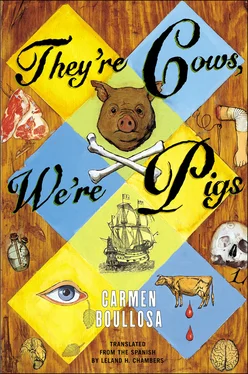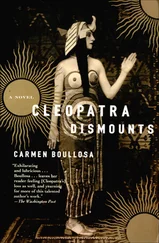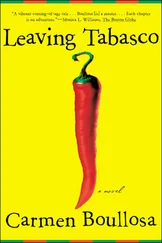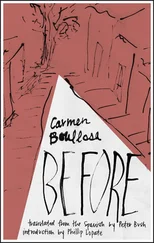Coming to land, they pushed the canoes up on the sand, where I remained as well, lying down now because of the wound in my leg. They circled around, with threats of devouring me .
In the midst of this great affliction, I remembered the glory I had once enjoyed, and I also saw before my eyes the bad luck that had been pursuing me since leaving Tortuga the last time. With my eyes damp from weeping, I began to sing the psalm “My God, My God, Why Hast Thou Forsaken Me?” which I had not sung even once since leaving childhood behind. Nearby were their women, in a field of manioc close to the sea. And I was forced to call out to them in their language, “I am your dinner, and now have I come!” and while saying these words I imagined that it was those of their sex who were to blame for the bad situation I found myself in — without knowing why I thought that .
They lit bonfires as soon as nighttime arrived, and arranged me in a hammock, my arms bound just as the hammock was bound to the poles holding it up. They hitched the ropes that went around my neck to the highest part of the tree and lay down all around me, talking and calling out, “You are my little creature, all tied up!”
At dawn everyone ran out from their villages to have a look at me, young and old. The men came with their bows and arrows, commending me to their women, and then led me away with them, some ahead, others behind me. They were singing and dancing the songs they usually do when they are about to devour someone .
In this fashion they brought me to a kind of fortification situated facing their huts; it was formed of long, heavy tree trunks, rather like a wall around a garden, and is useful against their enemies. When I entered the enclosure the women ran at me, slapping me and pulling at my beard, shouting at me in their own tongue, “In you I will take revenge for the blow that killed my friend, murdered by those who were with you!”
They led me afterward to a hut and forced me to lie down in a hammock. The women returned and went on slapping and pulling and tugging at me, telling me they were going to eat me. One woman approached with a piece of glass fixed in a bow-shaped stick, cutting off my eyelashes with that bit of glass. Then they wanted to shave off my mustaches and beard but I did not let them, until they brought some scissors left them by the Portuguese .
They began to prepare the special liquor they were to quaff after eating me. The fire was ready. They did not roast all of me whole but one part at a time, first one limb, then another … I was still alive when I saw even the children devouring parts of my body, chewing on chunks of my flesh, until the loss of blood made me lose consciousness, and my last breath left me the moment they drove a stake into my body as a spit for roasting torso and head together. I did not feel the fire. I do not know how the ceremony ended in which the Indians of Darien celebrated the feast provided by my body .

During our unsuccessful expedition there was a moment when, during the night, the memories with which le Nègre Miel peopled the darkness of his blindness began to rise up out of the nothingness.
I saw a lioness springing upon an antelope and devouring it. I saw the ostriches running over the savannah, the dense plantings breaking through the gray earth, the odd way they dressed their men and women, the way they painted their bodies and faces with many colors. I saw animals I do not know how to put names to, huge and strange and not always fearful. I did not know right away that these were le Nègre Miel’s memories, but as they kept recurring and became purified through the years I gradually realized that they were not mine, that inscribed within me, carefully assembled, as in a paradise, were the recollections of le Nègre Miel.
Even now, in that blindness which the passage of the centuries has presented me with, and which I am so grateful for, le Nègre Miel goes on making his way around that valley where the earth reaches its perfection, showing it to me as more perfect every day, as if it gets better and better the oftener it finds itself being repeated. The men, the women have now disappeared from those pictures. Only plants and animals reside there, plus that beautiful beast we call the earth, shining in the most miraculous cloud formations, its rivers, its mountains, the rustling of a breeze whispering nobly, continually …
We returned to Las Perlas and ran into good luck, a freebooter’s ship bound for Jamaica having touched there. From Port Royal, after visiting the women of The House to attend to their indispositions and problems, I returned to Tortuga, now terribly depressed. The island that awaited me was different. The Second Fifty had fallen upon it, Tortuga being changed from stem to stern, and not for the better. Bertrand d’Ogeron, he who was hated for a thousand and one reasons, had gotten what he wanted. In my absence, a ship with fifty females had arrived and the governor had them up for sale. Whoever purchased one could not take more than one, and that one had to be taken to wife. By the time I arrived he had sold eighteen females, three of whom had already left their husbands, with the latter now embroiled in a wrangle with d’Ogeron over the return of their purchase price. But the buying and selling was not what was disturbing the atmosphere on Tortuga. Each of the fifty women had taken possession of a boucan , those huts held in common which the Brothers of the Coast would normally stay in whenever they returned from an expedition, or else they would make use of some slave to build another; and now they had nowhere to lay their bodies down for sleeping except on the rocks and sands of Tortuga. Further, the females had decided they must be sold together with the boucan they were living in, so they could fix it up and arrange it to their liking, and the slaves were forbidden by the governor to cut trees or branches to make others or they would suffer the whip (with the excuse of managing the forests, as if there were anything to manage): all of which, without raising the price they might have brought without the boucan (there was no price on the cabañas, for they belonged to all), favored the interests of the governor who had had them brought from France, declaring them orphans mercifully released from an orphanage, so that the uncouth Tortuga men would change their adventuring life and settle down.
One had only to take a single look at those females the governor was advertising as orphans to doubt that such was their case: rather, they were trash taken out of La Salpêtrière, though not from the Mazarin section or the Lassay building, but from the heart of the institution, from La Force, the prison; and if one knew nothing of that and had only observed their behavior or listened to their language, which was so dissolute that it was surprising to find him persisting in his false claims, it would have been instantly clear that they were not simply destitute females but prostitutes lifted straight out of the mud first and then from the chains and subterranean jail cells of La Salpêtrière. Nor were they like the beautiful women of The House and the other brothels of Jamaica that our eyes had become accustomed to. Poorly nourished, and that is saying it too kindly: half dead from hunger, actually, and well along in years, they were more like dogs in a drought than women. Anyone would bet that none of them would have been sold.… Yet, as the days went by, twenty-seven more of them managed to get themselves bought.… But before getting to those twenty-seven that were sold after my return, I must come back to repeating that although everything seemed to have changed on Tortuga, and that much really had changed, still one tavern apparently had survived just as it was before my last departure, and I took shelter in it with the expectation of sleeping in a cave that many of the Brothers had taken as a dormitory, not far from Cayonne.
Читать дальше













